Questions & Answers
One of the challenging things about beekeeping is that the season can be both confusing and entertaining in equal measure.
It’s entertaining because it’s always a little bit different from the seasons that have preceded it. The environment changes. There’s an early spring, or late frosts, a drought, a monsoon or the local farmer changes from one strain of OSR to another.
Sometimes you get all of those in a single season … or month.
But not only does the environment change, so do your bees. Inevitably your queens will be replaced over the years. In turn, they influence the performance of the colony. Your virgins fly off to the drone congregation areas where they mate with the ‘bad boys’ from colonies run by a nearby beekeeper with much thicker gloves and a fleece under his beesuit 🙁
Mayhem ensues. Inspections get a whole lot less fun. Quickly.
Or you collect a swarm headed by a fecund queen who busies herself producing calm, prolific, frugal and productive workers.
The colony gets bigger. And bigger. It shows no signs of swarming.
As you add the fourth super you feel like you’ve really cracked this beekeeping lark.
Sorted 🙂
But these things also make beekeeping incredibly confusing to the newcomer.
If you take a calendar-centric view there is no right answer to ‘When will the colony swarm?’ or ‘Is this the right time to treat for mites?’ or ‘Should I remove the supers now?’.
And many beginners do have a calendar-based viewpoint. It’s so much easier to prepare if you’re told that swarming starts in the third week of May and the supers should be removed at the end of August.
Not only is that easier to understand, but the telltale signs that the bees produce aren’t – for a beginner – very good at telling tales.
The first half-hidden charged queen cell, a reduced laying rate, the reduction in loaded returning foragers etc.
But, for me, at least half of the enjoyment is deciphering these signs and working out what the colony is doing, or going to do.
And therefore, what I should be doing.
Questions and answers
Most of this is observation, interspersed with a bit of record keeping and sprinkled with some ‘best guesses’.
If you keep asking the (right) questions you will slowly but surely start finding the answers.
Are they running out of space, making more play cups, and slimming the queen down for the great escape?
But many of these things are too subtle for beginners overwhelmed by the difficulty in just finding the queen amongst 38,789 of her daughters.
Inevitably this means that beginners – quite rightly – ask other beekeepers lots of questions.
I did.
I still do.
And in this increasingly connected world, some of those questions take the form of internet searches.
And some of these questions pop up as search terms on this site.
Mites
Many of these queries are about mite management:
-
best time to treat for varroa in honey bees?
-
should bees be treated for mites in spring?
-
use apiguard in june?
- oxalic acid to treat varroa can i do it this week?
-
when to treat bees with oxalic acid in arkansas?
Very specific questions, very calendar-centric. There are hundreds more queries like these {{1}}.
A correct answer requires an understanding of the biology of the mite and an appreciation of the state of the hive.
Neither necessarily involves the calendar. Both can be acquired with a little homework and good observation. However, the very fact that ~25% of queries are about mite management emphasises that many struggle with this aspect of beekeeping.
I remain convinced that the biggest challenge new beekeepers face is how to effectively manage mites. Without proper mite management your colonies will perish.
If you lose your colonies every winter you soon get disheartened.
The easiest way to properly control mite numbers is with chemicals.
It’s what I do.
However, it’s not the only way.
Excellent beekeeping, selective rearing of mite-tolerant colonies (or of attenuated viruses!) and yet more excellent beekeeping – coupled with a favourable environment – may mean you can keep colonies without chemical intervention, and without excessive losses {{2}}.
All beginners lack the necessary experience to achieve this. Most lack the ability to learn the skills quickly enough to save their colonies and the majority probably live in areas that are unsuitable.
Most importantly, many beginners aren’t resilient enough to ‘learn the hard way’. They believe the (largely incorrect) statements about the evils of treatment, they want their bees to be ‘healthy and happy’ {{3}}, they like the sound of the term biodynamic {{4}} … but they cannot cope with losing their stocks every single winter through disease and starvation.
So they give up.
Learn to keep bees … then learn (again, using the years of knowledge already accumulated) to keep them without chemical intervention if you want. Not the other way round.
Read all you can – here and elsewhere – but remember that nothing is as valuable as time spent observing your bees.
Technical queries
These are the sorts of questions that probably can be easily answered {{5}}.
Remembering of course that there are usually at least two correct answers for every question, and any number of incorrect ones.
-
honey warming cabinet plans
-
how long does it take bees to chew through newspaper?
-
what is the chance of a queen being left in my hive when i have just lost a huge swarm?
- alighting board angle
-
where and how to set up bait hives?
My honey warming cabinet is one of the most useful things I’ve built for my beekeeping and the pages that first describe it, the plans and its use, remain some of the most popular on this site.
The answer to Q2 obviously depends upon how many sheets of newspaper are involved.
I think we all know the answer to Q3 and it’s not going to make the questioner happy 😉
It’s very rare that you can provide an absolute definitive answer in beekeeping. However, after many years of exhaustive, well-controlled and independently verified trials I have unequivocally shown that the answer to Q4 is 47.7°.
47.7° precisely
Not more, not less.
Remembering of course that a landing (alighting) board isn’t actually needed at all 😉
Tom Seeley has done the definitive studies on bait hives (Q5). He clearly describes the ‘where’. My recommendations are rather more pragmatic. It’s easier to monitor and move bait hives if they’re not 5 metres above the ground.
Miscellaneous or just weird
And then there are lots of queries that are simply amusing typos, nonsensical or just odd. My favourites this year are:
- maxant crank mechanism
-
langtorthe eke
-
how to wear rigger boots?
I’ve no idea how the first of these landed up on the apiarist.org as it’s a term I’ve never used. The middle query (Q2) is a typical typo. It’s an obvious one, but it constantly amazes me how good fuzzy matching algorithms are these days.
Q3 is about beekeeping footwear. My last pair of rigger boots were abandoned years ago when the lining fell apart and they eventually turned my feet to a bloody pulp.
How to wear them?
I wore mine while hobbling. It’s not something I’d recommend.
I now wear Muck boots – specifically the now discontinued Edgewater II short boots – which are lightweight, very comfortable and fully waterproof. No steel toe cap, but I never drop full supers.
Well, almost never.
Questions and comments
Not all questions originate in internet searches. Many come via the comments sections at the end of most posts. Most of these are both welcomed and useful; they allow me to clarify things that I’d presented confusingly, or they provide an opportunity to expand on parts of the post.
The numbers of comments have increased significantly this year.
This increase probably reflects the increased readership (and page accesses) of the site.
Alternatively it might mean the writing is getting worse as the comment numbers correlate with the increased length of posts 🙁
I try and answer as many comments/questions as I can. Many make very salient points and I’m very grateful for those who take the time to comment, either to correct me, to seek clarification or to provide their own insight on the topic.
I ignore those that are dogmatically stupid or just plain wrong. My prerogative. There’s enough bad advice on the internet without propagating more.
I apologise to those who comment via Facebook or Twitter. I almost exclusively use both for promoting posts made here {{6}}. Both generate a lot of traffic to this site but I simply don’t have time (or interest) to use them interactively.
If you want to contact me do so via the comments section or the, aptly named, contact form.
More Readers’ Questions
Which, in a rather circuitous way, brings me to the Readers’ Questions Answered column in the BBKA News. I was asked to tackle these a few months ago and January and February are already written {{7}}.
The BBKA News is the monthly newsletter of the British Beekeepers Association. It has a circulation of ~25,000. Each year a different victim expert mug contributor prepares the answers. I’m taking over from Bob Smith, NDB from Medway BKA who did an excellent job and will be a hard act to follow. Some of the previous contributors have been anonymous which might have been a sensible option, but it’s too late for me now.
My family joke that I’m now an agony aunt for beekeepers.
I discussed this with Calum, a regular contributor to the comments section of these pages, who provided (as usual) some very sage advice, including “Bees put up with a lot of sh1t from beekeepers”. I don’t think the BBKA will want to use that as my strapline but it certainly sums things up pretty accurately.
Happy New Year … may your queens be well mated, your mite numbers low, your supers heavy and may your prime swarms be in my bait hives 🙂
{{1}}: In total these probably account for ~25% of the tens of thousands of searches that land here every year.
{{2}}: May was deliberately italicised … there are no guarantees. Also note inclusion of the word excessive … your definition of this may be different from mine. The UK and US average winter losses are ~25-30%, mine are ~10% or less.
{{3}}: Who doesn’t?
{{4}}: WTF?
{{5}}: Though not necessarily here.
{{6}}: And that’s all done automagically … I almost never login.
{{7}}: And the first of these may be published by the time this post appears.

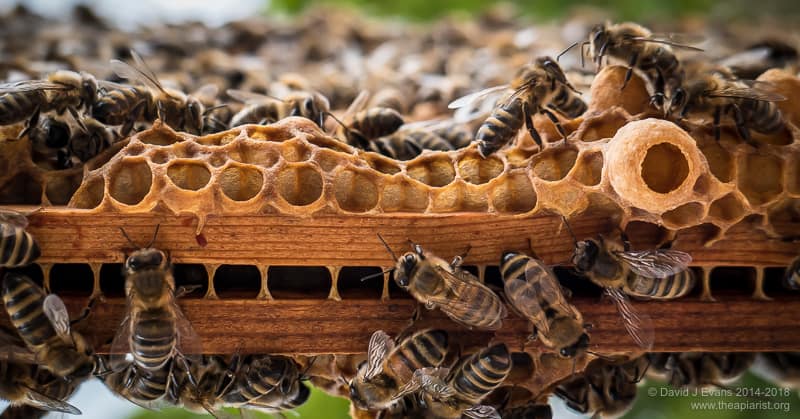

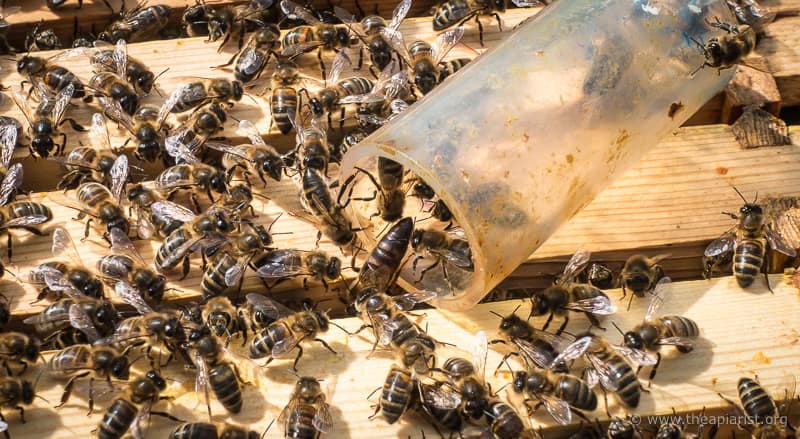
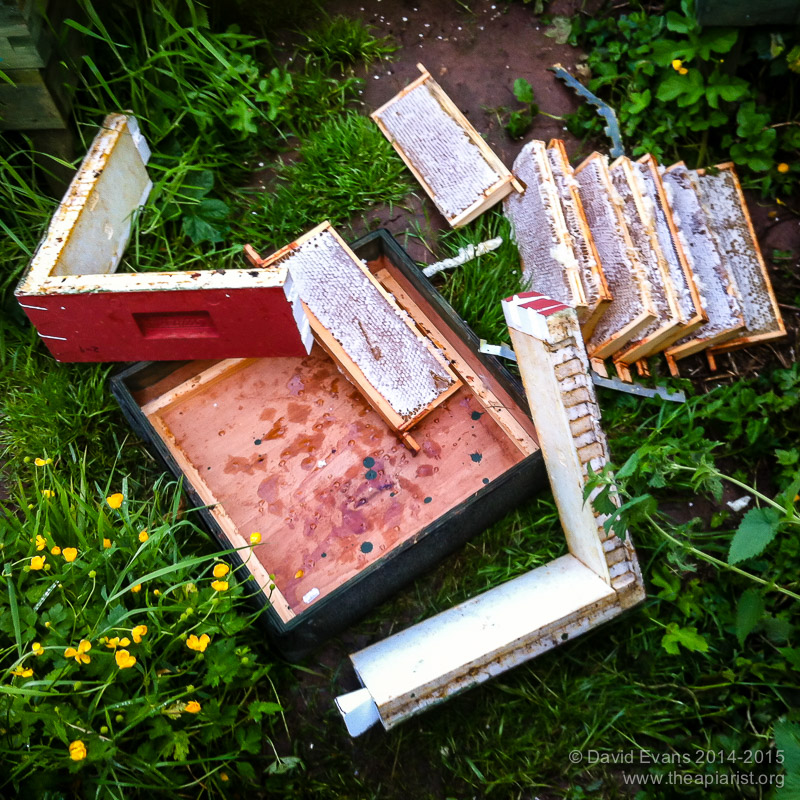
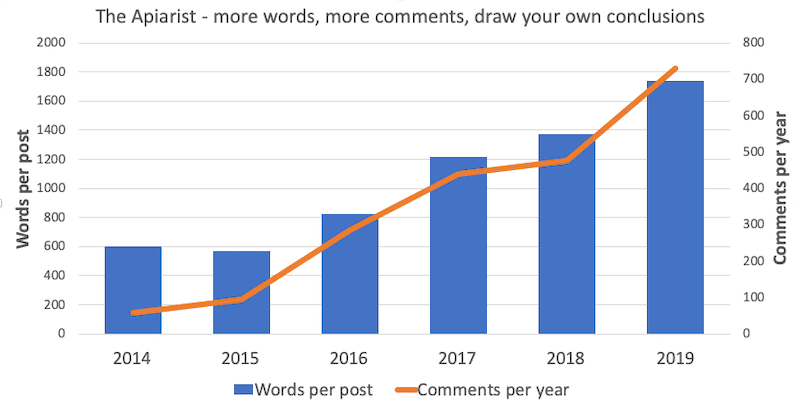
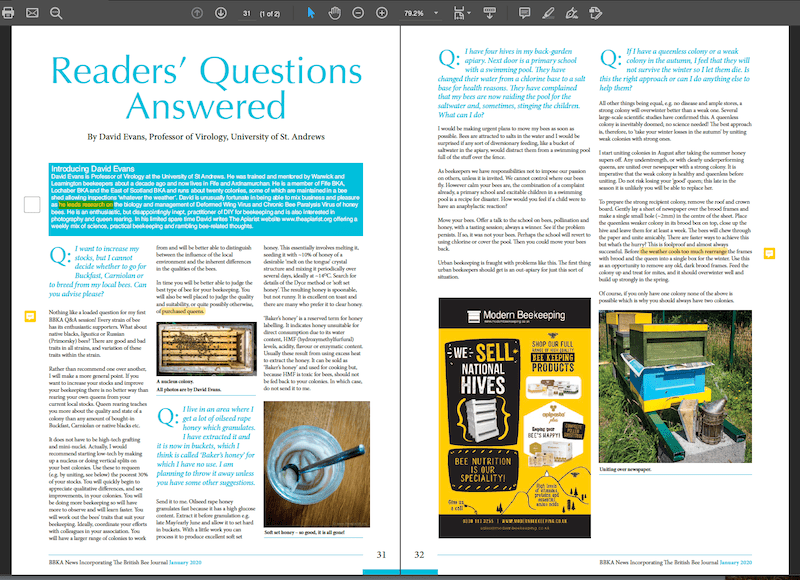
Join the discussion ...